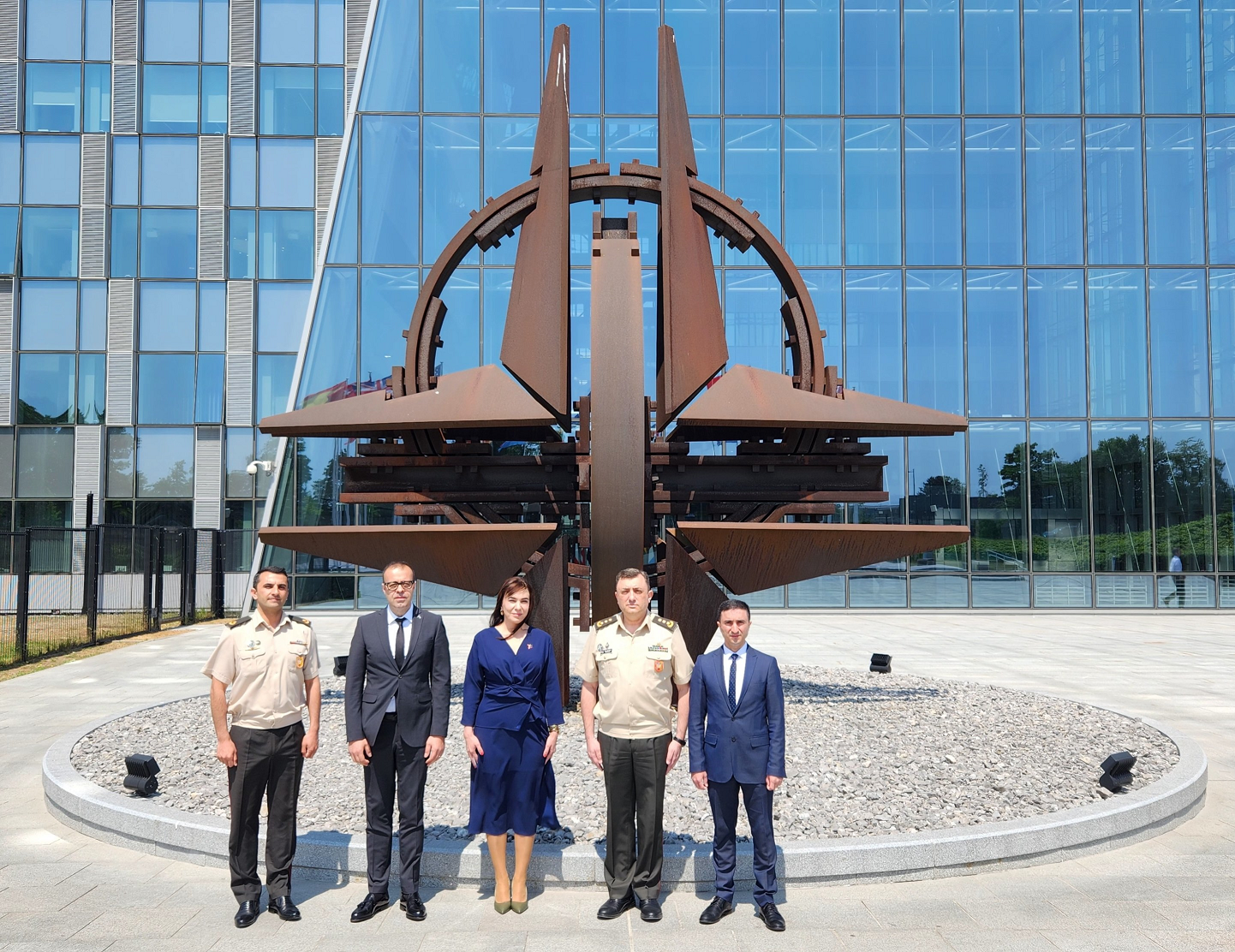Azerbaijan has been invited for the first time to the meeting of the NATO Military Committee to be held on energy security in the "NATO+partners" expanded format.
Head of Mission of Azerbaijan to NATO, Jafar Huseynzada, said Board Member of Center of Analysis of International Relations of Azerbaijan, Dr Esmira Jafarova, will brief the meeting participants on energy security at NATO headquarters in Brussels.
"Along with this, Dr. Jafarova will hold bilateral meetings with Michael Ruhle, Head of Climate and Energy Security Section of NATO, and the leadership of the NATO Energy Security Centre of Excellence in Lithuania," Huseynzade wrote on Twitter.
Earlier on May 16, a dialogue on energy security took place between NATO and Azerbaijan at the headquarters of the military bloc.
During the meeting, Azerbaijan’s Deputy Minister of Energy Elnur Soltanov spoke about his country’s successful energy strategy, the significance of the Southern Gas Corridor, and Baku’s contribution to the energy security of Europe.
On May 26, NATO Secretary General’s Special Representative for the Caucasus and Central Asia Javier Colomina held discussions in Baku with the Azerbaijani officials on the country’s role in energy security.
Meanwhile, on June 3, President Ilham Aliyev and NATO Secretary General Jens Stoltenberg held a short meeting on the sidelines of Recep Tayyip Erdogan's inauguration as the President of Türkiye in Ankara.
Since December 31, 2020, Azerbaijan has been supplying natural gas to Europe via the Trans Adriatic Pipeline (TAP), which forms the final segment of the Southern Gas Corridor (SGC). TAP starts at the Turkish-Greek border and runs along 773-kilometer onshore and 105-kilometer offshore routes traversing Greece and Albania toward its final destination in Italy.
The three-segmented SGC spans seven countries and six regulatory systems, linking 11 different investors, and supplying 12 different gas buyers, primarily in Europe. The pipeline’s initial 16 billion cubic meters (bcm) annual transportation volume is shared between Türkiye and Europe, which receive 6 bcm and 10 bcm, respectively. The main source of natural gas for the SGC is Azerbaijan’s offshore Shah Deniz field, with an estimated 1.2 trillion cubic meters of proven reserves.
Currently, the European market accounts for the largest share of daily gas exports from Azerbaijan. European consumers are supplied with about 27 million cubic meters of Azerbaijani gas per day.
In 2021, Europe received 8 bcm of gas from Azerbaijan, which increased to 11.4 bcm in 2022.
Starting in 2023, Azerbaijan is expected to supply 12 bcm of gas per year to the EU. By 2027, the total volume of gas deliveries to Europe is forecast to reach 20 bcm annually. President Aliyev said that Azerbaijan's proven gas reserves of 2.6 trillion cubic meters make it possible to send more blue fuel to European consumers.
Relations of Azerbaijan with NATO started in 1992, when the country joined the North Atlantic Cooperation Council.
More than 3,000 Azerbaijani servicemen have supported various peace-building missions worldwide over the last two decades, including efforts in Iraq, Kosovo and Afghanistan, which has been the focus of Azerbaijan’s longest-running international security mission.
For nearly two decades, Azerbaijan was the only non-NATO Muslim-majority country to partner NATO in Afghanistan.
The first Azerbaijani peacekeeping unit arrived in Afghanistan in 2002 to join the International Security Assistance Force (ISAF). Twenty-one Azerbaijani soldiers, one officer, and one non-commissioned officer were the first peacekeepers from the Commonwealth of Independent States region to serve alongside NATO troops. In 2015, Azerbaijani peacekeepers joined Resolute Support – the NATO-led train, advise and assist mission in Afghanistan, which followed ISAF. As of May 2021, 120 Azerbaijani peacekeepers served there, including two medical officers, six staff officers, and soldiers.
In addition to ground support, Azerbaijan helped transport goods to allied forces, making military logistics easier and faster. Around 40 percent of cargo destined for NATO troops in Afghanistan passed through Azerbaijan.







 The Mine Action Agency of Azerbaijan (ANAMA) reported on Thursday the discovery of a significant amount of explosives in the Khojavand district of ...
The Mine Action Agency of Azerbaijan (ANAMA) reported on Thursday the discovery of a significant amount of explosives in the Khojavand district of ...
 Iran’s Foreign Minister, Hossein Amir-Abdollahian, has labeled a foiled Israeli drone attack in certain parts of the country as a "failure" for Isr...
Iran’s Foreign Minister, Hossein Amir-Abdollahian, has labeled a foiled Israeli drone attack in certain parts of the country as a "failure" for Isr...
 Iran has refuted reports of alleged damage to Shimon Peres Negev Nuclear Research Centre located southeast of Dimona, Israel, during the recent air...
Iran has refuted reports of alleged damage to Shimon Peres Negev Nuclear Research Centre located southeast of Dimona, Israel, during the recent air...



